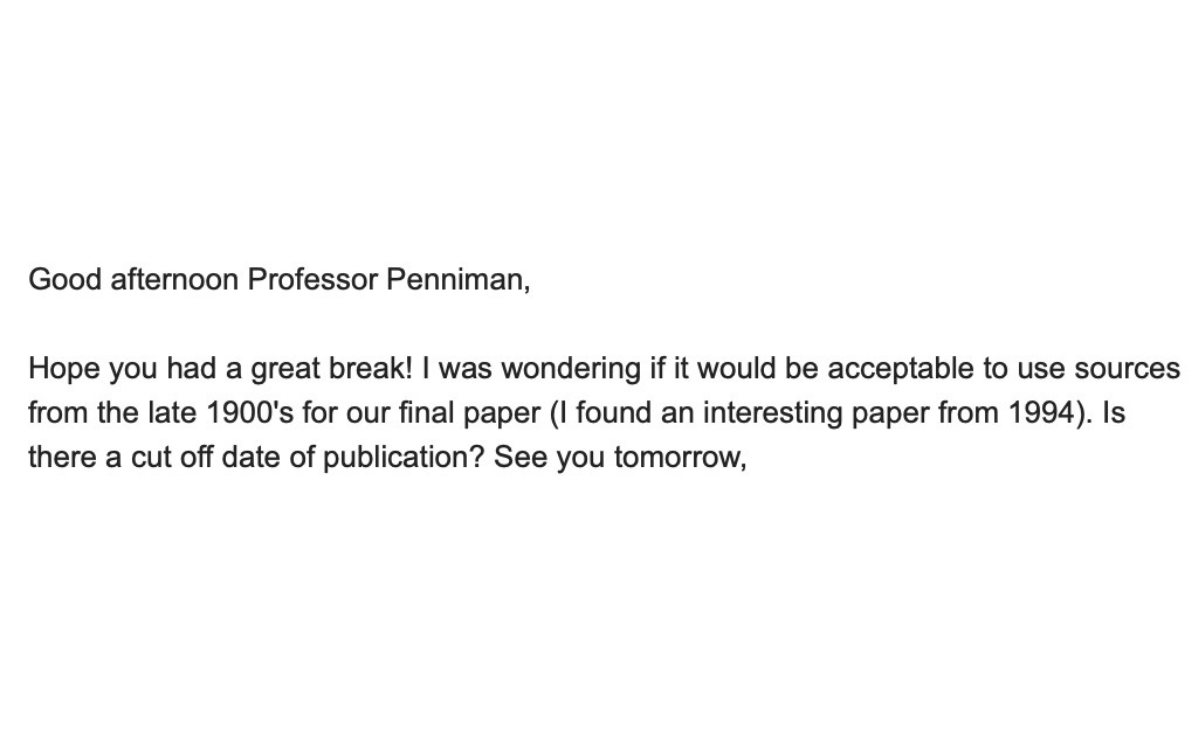A university professor has shared an email from a student that sparked a painful moment of personal realization.
John Penniman, who is an associate professor and chair of the department of Religious Studies at Bucknell University, took to Twitter to share the contents of the message, writing “I will never recover from this student email.”
Though the message was shared partly in jest, it sparked what Penniman told Newsweek was a moment of “millennial realization” as a painful truth dawned on a generation of people across social media: “we are not young anymore.”
Emily Paine
At some point in every person’s life, they reach a point where they stop feeling young. According to a 2018 report by the Worldwide Independent Network of Market Research, for most Americans that point is when they hit the age of 43.
It came a little earlier for the 41-year-old Penniman though when he opened an email from “a really thoughtful student” in one of his classes.
“They are required to use academic sources not covered in the syllabus for their research papers,” he explained. “This student was being diligent in making sure they weren’t using sources that would be considered out of date. Earlier in the semester, several other classmates had found sources from the 1920s and 1930s and we all discussed why these might not be the strongest academic arguments to work with.”
According to the email, the sources they were concerned might be out-of-date came from “the late 1900s” or more specifically 1994. Initially, Penniman thought little of it, writing back that the source “would be acceptable.”

John Penniman
“Only after I fired off my reply did the student’s phrasing of ‘late 1900s’ begin to hit me,” he said. “I couldn’t stop laughing at it, especially since I am a ‘geriatric millennial.’ There’s an additional irony here too in the fact that I study a period called ‘late antiquity’ that was invented by historians, and the student’s email humorously (and painfully!) drove home the fact that we are all destined to become relics of bygone eras in the eyes of future generations.”
Amused at the question, he decided to share it to his Twitter, @Historiographos. “I knew my academic friends and colleagues online would enjoy the accidental knock-out punch delivered by this student,” he said.
What Fenniman could never have predicted, however, was how much it would explode with the tweet earning over 22 million views and counting. “The first 48 hours were wild,” he said. “I jumped from 1400 followers to 4500. It made Reddit, then the meme accounts on Instagram, then people were sending me emails of screenshots from Facebook posts. I heard from students I taught over a decade ago, my middle-school girlfriend (from 1994) messaged me about it, people came out of the woodwork.”
Having read through thousands of the comments his tweet generated, Fenniman has a pretty clear and eloquent view on why it went viral.
He said: “Many of us are not ready to think of 1994 as ‘old.’ For example, millennials have occupied this very weird space, generationally, since we came of age. We have been mocked as the ‘participation trophy’ generation and the ‘spent too much money on avocado toast and now can’t afford a house’ generation.”
Fenniman continued: “But at key life stages, this generation has been impacted by huge events: the rise of school shootings, 9/11 and two wars, economic collapse, higher debt, COVID, the erosion of democratic norms. Perhaps what the ‘late 1900s’ phrase humorously points to is the millennial realization that we never quite got our feet under us and now we are who we will be. We are coming to terms with the fact that we are not young anymore. And maybe this is revealing a generational midlife crisis that we hadn’t fully acknowledged yet. Or maybe I’m just speaking for myself!”
Whatever the case, Fenniman said he “loved the question” and described working with “curious, thoughtful, and proactive” students like the one who emailed him as the “best part” of his job.
“The student has been a really good sport about the whole thing,” he said. “We had a laugh after class about how it went unexpectedly viral, and they thought it was hilarious how the email touched a nerve with so many people (though they never intended to do that).”
Uncommon Knowledge
Newsweek is committed to challenging conventional wisdom and finding connections in the search for common ground.
Newsweek is committed to challenging conventional wisdom and finding connections in the search for common ground.


